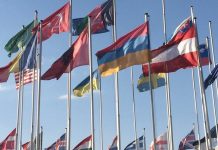Notes:
[1] Christopher Layne, “The unipolar exit: beyond the Pax Americana,” Cambridge Review of International Affairs, Vol. 24, Iss. 2 (Jul 2011): 149–164; Fareed Zakaria, “The Self-Destruction of American Power: Washington Squandered the Unipolar Moment,” Foreign Affairs, July 2019; Bidisha Biswas and Anish Goel, “What Comes After US Hegemony? The Asia-Pacific region looks beyond the United States,” The Diplomat, December 19, 2018; Ron Huisken, “China, the US and the Waxing and Waning of Power,” The Strategist, May 21, 2020.
[2] Graham Allison, Destined for War: Can America and China Escape Thucydides’s Trap? (Mariner Books, 2017).
[3] David Brown, “Why China Could Win the New Global Arms Race,” BBC News, July 28, 2022; Anjani Trivedi and Shuli Ren, “Good Luck Taking Away China’s Manufacturing Mojo,” The Washington Post, August 24, 2022; “China Increases Investments in PNG, Sparking Security Fears for Australia,” News.com.au, July 4, 2022.
[4] Paul McLeary, “Indo-Pacific Commander Delivers $27 Billion Plan to Congress,” Breaking Defense, March 1, 2021.
[5] “United States Imports from China,” TradingEconomic.com
[6] Iain Marlow, “Taiwanese Independence is a Charging Rhino That Must Be Stopped, Chin Says,” Bloomberg, September 22, 2022; Alys Davies, “Taiwan Tensions: China Condemns ‘manic’ Visit as Pelosi Continues Tour,” August 4, 2022.
[7] Qiao Liang and Wang Xiangsui, Unrestricted Warfare (People’s Liberation Army Publishing House, 1999): 24.
[8] Lt Gen PC Katoch, “Economic Warfare – Nuances in 21st Century,” Journal of the Centre for Joint Warfare Studies (Dec 2014).
[9] Daniel Immerwahr, How to Hide an Empire: A History of the Greater United States (Farrar, Straus and Giroux, 2019): 215 – 227; 298 – 336; Greg Castillo, “Domesticating the Cold War: Household COnsumption as Propaganda in Marshall Plan Germany,” Journal of Contemporary History, Vol. 40 (2005): 261 – 288.
[10] Yangbin Chen, “From ‘Lamb Kebabs’ to ‘Shared Joy’: Cultural Appropriation, Ignorance and the Constrained COnnectivity within the ‘One Belt, One Road’ Initiative,” Journal of Contemporary China, Vol 29 (2020): 1 – 16; Andrei Miroiu, “Deportations and Counterinsurgency,” Studia Politica, Romain Political Science Review, Vol 2 (2015): 177 – 194.
[11] Daniel Hughes and Andrew Colarik, “Small State Acquisition of Offensive Cyberwarfare Capabilities: Towards Building an Analytical Framework,” Intelligence and Security Informatics (2016): 166 – 179.
[12] Simone Dossi, “On the asymmetric advantages of cyberwarfare: Western literature and the Chinese Journal Guofang Keji,” Journal of Strategic Studies, Vol 43, Iss 2, (2020): 281-308.
[13] Thomas Rid, Active Measures: The Secret History of Disinformation and Political Warfare (New York: Picador 2020): 61 -134.
[14] Thomas Rid, Active Measures: The Secret History of Disinformation and Political Warfare (New York: Picador 2020): 367.
[15] David C. Gompert and Martin C. Libicki, “Decoding the Breach: The Truth About the CENTCOM Hack,” The RAND Blog, February 3, 2015.
[16] Tomohisa Hattori, “Reconceptualizing Foreign Aid,” Review of International Political Economy, Vol 8 (2001): 633 – 660.
[17] Jennifer Hillman and Alex Tippett, “Who Built That? Labor and the Belt and Road Initiative,” Council on Foreign Relations, July 6, 2021.
[18] Qiao Liang and Wang Xiangsui, Unrestricted Warfare (People’s Liberation Army Publishing House, 1999): 206.
[19] Kang-Chun Cheng, “Chinese Businesses are at the Forefront of Environmental Change in Africa,” Quartz Africa, July 20, 2022.
[20] Hongying Wang & Yeh-Chung Lu, “The Conception of Soft Power and its Policy Implications: a comparative study of China and Taiwan,” Journal of Contemporary China, Vol. 47, Iss. 56, (2008): 425-447
[21] Kenneth Osgood, Total Cold War: Eisenhower’s Secret Propaganda Battle at Home and Abroad (University Press of Kansas 2006).
[22] Andrew Dowse and Sascha Dov Bachmann, “Information warfare: methods to counter disinformation,” Defense & Security Analysis (Sep 2022).










